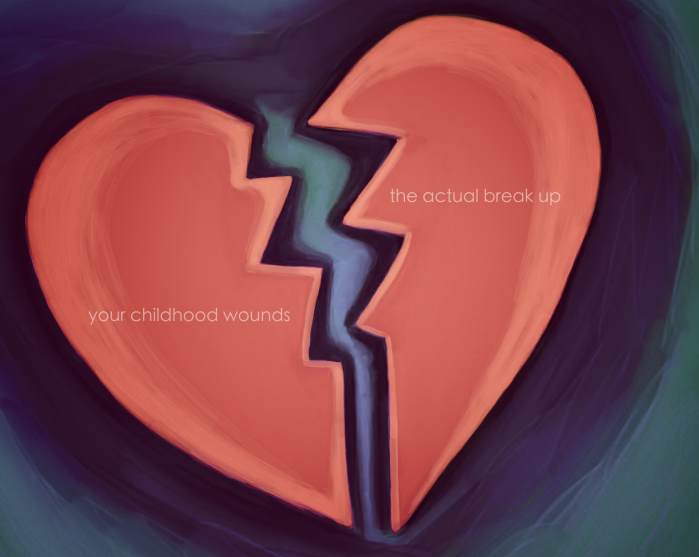When we break up with someone, it can hurt tremendously. We can feel like we can’t go on. We find ourselves wondering why does it hurt so bad? A big part of why break ups are so painful is that childhood wounds come back to surface. We all carry raw wounded parts within us and when we experience a highly distressing relationship event, like a break up, our childhood wounded parts get triggered instantly. A lot of what we think and feel about ourselves and others we are in relationships with, originated from early childhood beliefs.
Let’s use a hypothetical example to illustrate the pain activation of a raw emotional wound. Bill and Jackie have been dating for 4 months. Bill decides he isn’t at a point in his life where he can commit to a relationship. He wants to travel and see the world and Jackie is unable to do so because her work ties her to her native city. The couple split up, and Jackie is having a terrible time getting over the break up. She starts to question why she wasn’t enough for Bill? If she was enough wouldn’t he have been ready? What Jackie doesn’t realize is that she is making an assumption, an assumption that Bill thinks she is not enough. This is an assumption that stems from her wounded part of her that always felt she wasn’t good enough as a child. Her parents were workaholics and she was often left with babysitters. When she would ask them to stay, they would tell her to be a big girl and stop crying. Mommy and daddy were busy. She always felt they didn’t understand how much she cared about them and as a little girl she internalized this feeling to believe that something must be wrong with her if they didn’t want to spend time with her. If she were a better child, she thought, then her parents would have spent more time with her. As a child, Jackie couldn’t realize that there were many other reasons why her parents had to work so much, in actuality they were in severe debt and experienced constant financial struggle, all of which had nothing to do with Jackie. Later as an adult, when something goes wrong in a relationship, this “not good enough” wound Jackie has carried from childhood gets activated again. She remembers the pain of being left alone so much as a child once her and her partner break up. She finds herself down on the thought that her whole life, she has never felt good enough for anyone to love her truly. This spirals her into a post-break up depression as she ruminates over this belief.
Empowered with the knowledge that a part within us in largely contributing to our pain, we can reframe our thinking more realistically after a break up. For Jackie, she can do this by recognizing a similarity in the way that she often felt sad as a child and noticing that same feeling coming up as a an adult in a completely different relationship. She can start to challenge the belief that as an adult people often abandon her because she isn’t good enough. Instead, she can remind herself of all of the loving friends she has who truly appreciate and cherish her, she can realize how fun she is and she can remember how kind and giving she is in relationships; which are all signs that point to the fact that she is enough! She can also put in perspective that sometimes we just aren’t the right fit for each other in relationships and we must move on; which is not a measure of self-worth but a simple fact of life. Jackie can then start to think more realistically about the true reasons behind the break up and the pain will dissipate. When we understand and reality check our old wounds in present time, we heal both our childhood pain and the pain of the break up. What wound comes up when you experience the pain of a break up or bad fight with your partner? Do some self-reflection and get to healing!


Per erat natum scribentur eu, ne vim congue ullamcorper. Sint rebum graeco ad ius. Qui no invidunt legendos. Sea an atqui choro melius. Ex sea suas dictas pri case.
View all posts by Cassandra Petrella, MA